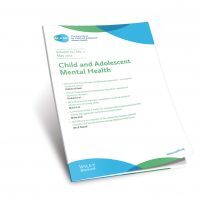Outcomes research
-

Kindergarten conduct problems are associated with monetized outcomes in adolescence and adulthood
Open Access paper from the JCPP – ‘Participants were from two multisite longitudinal studies: Fast Track and the Child Development Project. Parents and teachers reported on kindergarten conduct problems, administrative and national database records yielded indexes of criminal offending, and participants self-reported their government and medical service use. Outcomes were assigned costs, and significant associations were adjusted for inflation to determine USD 2020 costs.’ Natalie Goulter (pic) et al.
Read more -

Is age of onset and duration of stimulant therapy for ADHD associated with cocaine, methamphetamine, and prescription stimulant misuse?
Open Access paper from the JCPP – This study aimed to assess whether age of onset and duration of stimulant therapy for attention-deficit/hyperactivity disorder (ADHD) are associated with cocaine, methamphetamine, and prescription stimulant misuse during adolescence. Sean Esteban McCabe (pic) et al.
Read more -

Secondary data analysis of social care records to examine the provision of mental health support for young people in care
Open Access paper from JCPP Advances – ‘Using routinely collected social care data, we explored the provision of mental health support for 112 young people in care in the UK.’ Alice R. Phillips (pic) et al.
Read more -

Association between depression diagnosis and educational attainment trajectories: an historical cohort study using linked data
Open Access paper from the JCPP – To understand the association between clinical depression and course of attainment, we aimed to investigate the attainment trajectories that are generally observed among a community sample of pupils, and test the hypothesis that depression diagnosis is associated with membership of lower or declining attainment trajectories. Alice Wickersham (pic) et al.
Read more -

Incidence and outcomes of eating disorders during the pandemic: what has changed?
During the pandemic, the NHS CAMH eating disorder services saw almost a doubling in the number of referrals for eating disorders and waiting list times are now surpassing what is recommended. This surge in eating disorder presentations in clinical settings led researchers to wonder what impact, if any, Covid-19 had on the incidence of eating disorders in young people.
Read more -

Short Research Article: COVID-19 and its impact on child and youth mental health service demand in the community and emergency department
Open Access paper from the CAMH journal – “The number of monthly presentations and referrals to respectively the emergency department (ED) and community CYMHS were compared among 2018, 2019 and 2020. The study shows a marked increase in referrals to ED starting from July and in the community from May 2020”. Amy M. Tedja et al.
Read more -

Latent class analysis to characterize neonatal risk for neurodevelopmental differences
Open Access paper from the JCPP – “Neonatal risk factors, such as preterm birth and low birth weight, have been robustly linked to neurodevelopmental deficits, yet it is still unclear why some infants born preterm and/or low birth weight experience neurodevelopmental difficulties while others do not”. Allison M. Momany (pic) et al.
Read more -

Do CAMHS collect less PROM data from certain sociodemographic groups?
Patient-reported outcome measures (PROMs) are routinely used to inform clinicians and policymakers on clinical need and treatment efficacy. Yet despite their great value and utility, it seems that there is a low rate of outcome monitoring in Child and Adolescent Mental Health Services (CAMHS).
Read more -

A history of abuse increases the risk of suicide attempts in youth
Researchers in Belgium and the USA have conducted one of the first investigations into whether a history of various forms of abuse and the presence of mood disorders and psychotic symptoms can predict suicide attempts in psychiatrically hospitalized children.
Read more -

Can population registry data predict which children with ADHD are at risk of later substance use disorders?
The first study to examine the potential of machine learning in early prediction of later substance use disorders (SUDs) in youth with ADHD has been published in the Journal of Child Psychiatry and Psychology.
Read more